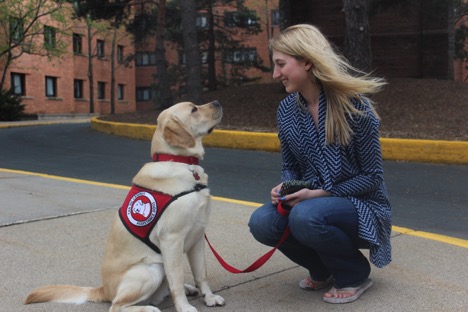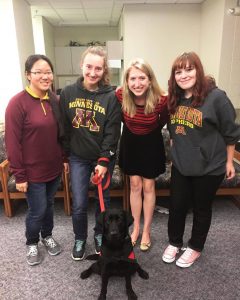Can Do Canines worked with two journalism students from the Access U to feature the work of eight pre-vet students who participated in the FETCH Program at the University of Minnesota.
The FETCH (Fostering Education and Training Canines in Housing) Program provides pre-vet students with the opportunity to assist with the training of a future assistance dog for 2-5 months. As part of the experience, students are responsible for the around-the-clock care of one assistance dog. Their primary responsibility is to help socialize the dog before they go on to their final stage of training.
By Sally Samaha – May 5, 2017 (Access U)
Last fall, pre-vet sophomore Jennifer Warner walked her black labrador Rose to the Campus Connector.
As the bus stopped, Rose balked and began to bark. All that might be no big deal for a pet dog. But for  Warner, it was a big opportunity to train Rose to board the bus calmly—a skill the dog would need if she were to become a service dog assisting with needs related to mobility, autism, hearing, seizures, and diabetes.
Warner, it was a big opportunity to train Rose to board the bus calmly—a skill the dog would need if she were to become a service dog assisting with needs related to mobility, autism, hearing, seizures, and diabetes.
Warner is part of a new program at the University of Minnesota that pairs pre-veterinary students with dogs from Can Do Canines, a nonprofit based out of New Hope that provides service dogs. The partnership, known as the Fostering Education and Training Canines in Housing—the FETCH program—gives pre-vet students the opportunity to learn what service dogs do while Can Do Canines can use the university’s bustling campus to socialize their in-training pups.
“Overall, everybody who has been involved in the program has just really enjoyed their experience,” said Kristie Feist, the assistant department director for Housing and Residential Life (HRL) and the coordinator for the FETCH program.
To make FETCH a reality this fall, Can Do Canines partnered with not only HRL, but also the College of Veterinary Medicine; the College of Food, Agriculture, and Nutritional Sciences; and the Assistance Dogs Organization.

“Both the students and the partners we work with all have been extremely supportive of us,” Feist said, “so all around, I think everyone is really happy.” Can Do Canine’s goal in 2017 is to match a total of 56 dogs with their clients.
In all, it takes about two years for a Can Do Canines dog to be ready for service, and FETCH is just one part of that training process. The dogs also move through foster homes and other programs similar to FETCH—some also take part in a prison puppy foster program that allows inmates to teach the dogs basic obedience, assisting skills and socialization. When all of the training is completed, the dogs are then assigned to an owner to assist with disabilities.
For pre-vet students, the opportunity to train dogs is an easy way to integrate their love for animals into learning about providing service for the disability community. The program is only open to a limited number of students and is housed in Bailey Hall on the St. Paul campus along with the pre-vet residential community.
To learn more about the FETCH Program: https://housing.umn.edu/llcs/fetch.




